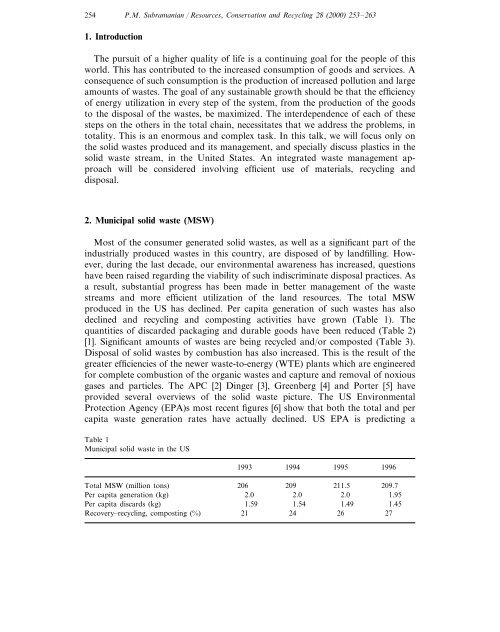Article - Plastics recycling and waste management in the US, Quản lý và tái chế nhựa ở Hoa Kỳ (Vietsub)
https://app.box.com/s/c22z4r9i16a9jazrp4hdh6jefj6nekz5
https://app.box.com/s/c22z4r9i16a9jazrp4hdh6jefj6nekz5
You also want an ePaper? Increase the reach of your titles
YUMPU automatically turns print PDFs into web optimized ePapers that Google loves.
254<br />
P.M. Subramanian / Resources, Conseration <strong>and</strong> Recycl<strong>in</strong>g 28 (2000) 253–263<br />
1. Introduction<br />
The pursuit of a higher quality of life is a cont<strong>in</strong>u<strong>in</strong>g goal for <strong>the</strong> people of this<br />
world. This has contributed to <strong>the</strong> <strong>in</strong>creased consumption of goods <strong>and</strong> services. A<br />
consequence of such consumption is <strong>the</strong> production of <strong>in</strong>creased pollution <strong>and</strong> large<br />
amounts of <strong>waste</strong>s. The goal of any susta<strong>in</strong>able growth should be that <strong>the</strong> efficiency<br />
of energy utilization <strong>in</strong> every step of <strong>the</strong> system, from <strong>the</strong> production of <strong>the</strong> goods<br />
to <strong>the</strong> disposal of <strong>the</strong> <strong>waste</strong>s, be maximized. The <strong>in</strong>terdependence of each of <strong>the</strong>se<br />
steps on <strong>the</strong> o<strong>the</strong>rs <strong>in</strong> <strong>the</strong> total cha<strong>in</strong>, necessitates that we address <strong>the</strong> problems, <strong>in</strong><br />
totality. This is an enormous <strong>and</strong> complex task. In this talk, we will focus only on<br />
<strong>the</strong> solid <strong>waste</strong>s produced <strong>and</strong> its <strong>management</strong>, <strong>and</strong> specially discuss plastics <strong>in</strong> <strong>the</strong><br />
solid <strong>waste</strong> stream, <strong>in</strong> <strong>the</strong> United States. An <strong>in</strong>tegrated <strong>waste</strong> <strong>management</strong> approach<br />
will be considered <strong>in</strong>volv<strong>in</strong>g efficient use of materials, <strong>recycl<strong>in</strong>g</strong> <strong>and</strong><br />
disposal.<br />
2. Municipal solid <strong>waste</strong> (MSW)<br />
Most of <strong>the</strong> consumer generated solid <strong>waste</strong>s, as well as a significant part of <strong>the</strong><br />
<strong>in</strong>dustrially produced <strong>waste</strong>s <strong>in</strong> this country, are disposed of by l<strong>and</strong>fill<strong>in</strong>g. However,<br />
dur<strong>in</strong>g <strong>the</strong> last decade, our environmental awareness has <strong>in</strong>creased, questions<br />
have been raised regard<strong>in</strong>g <strong>the</strong> viability of such <strong>in</strong>discrim<strong>in</strong>ate disposal practices. As<br />
a result, substantial progress has been made <strong>in</strong> better <strong>management</strong> of <strong>the</strong> <strong>waste</strong><br />
streams <strong>and</strong> more efficient utilization of <strong>the</strong> l<strong>and</strong> resources. The total MSW<br />
produced <strong>in</strong> <strong>the</strong> <strong>US</strong> has decl<strong>in</strong>ed. Per capita generation of such <strong>waste</strong>s has also<br />
decl<strong>in</strong>ed <strong>and</strong> <strong>recycl<strong>in</strong>g</strong> <strong>and</strong> compost<strong>in</strong>g activities have grown (Table 1). The<br />
quantities of discarded packag<strong>in</strong>g <strong>and</strong> durable goods have been reduced (Table 2)<br />
[1]. Significant amounts of <strong>waste</strong>s are be<strong>in</strong>g recycled <strong>and</strong>/or composted (Table 3).<br />
Disposal of solid <strong>waste</strong>s by combustion has also <strong>in</strong>creased. This is <strong>the</strong> result of <strong>the</strong><br />
greater efficiencies of <strong>the</strong> newer <strong>waste</strong>-to-energy (WTE) plants which are eng<strong>in</strong>eered<br />
for complete combustion of <strong>the</strong> organic <strong>waste</strong>s <strong>and</strong> capture <strong>and</strong> removal of noxious<br />
gases <strong>and</strong> particles. The APC [2] D<strong>in</strong>ger [3], Greenberg [4] <strong>and</strong> Porter [5] have<br />
provided several overviews of <strong>the</strong> solid <strong>waste</strong> picture. The <strong>US</strong> Environmental<br />
Protection Agency (EPA)s most recent figures [6] show that both <strong>the</strong> total <strong>and</strong> per<br />
capita <strong>waste</strong> generation rates have actually decl<strong>in</strong>ed. <strong>US</strong> EPA is predict<strong>in</strong>g a<br />
Table 1<br />
Municipal solid <strong>waste</strong> <strong>in</strong> <strong>the</strong> <strong>US</strong><br />
1993 1994 1995 1996<br />
Total MSW (million tons) 206<br />
209<br />
211.5 209.7<br />
Per capita generation (kg) 2.0 2.0<br />
2.0<br />
1.95<br />
Per capita discards (kg) 1.59 1.54 1.49 1.45<br />
Recovery–<strong>recycl<strong>in</strong>g</strong>, compost<strong>in</strong>g (%)<br />
21 24 26<br />
27

















